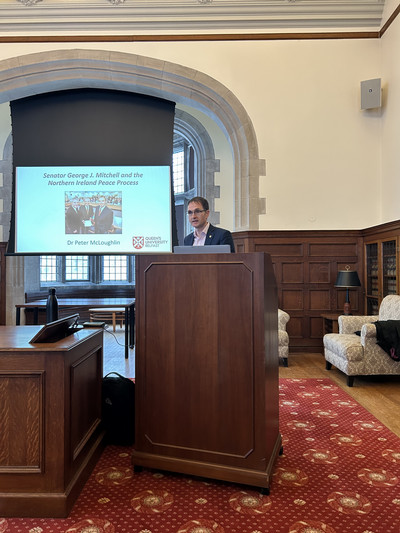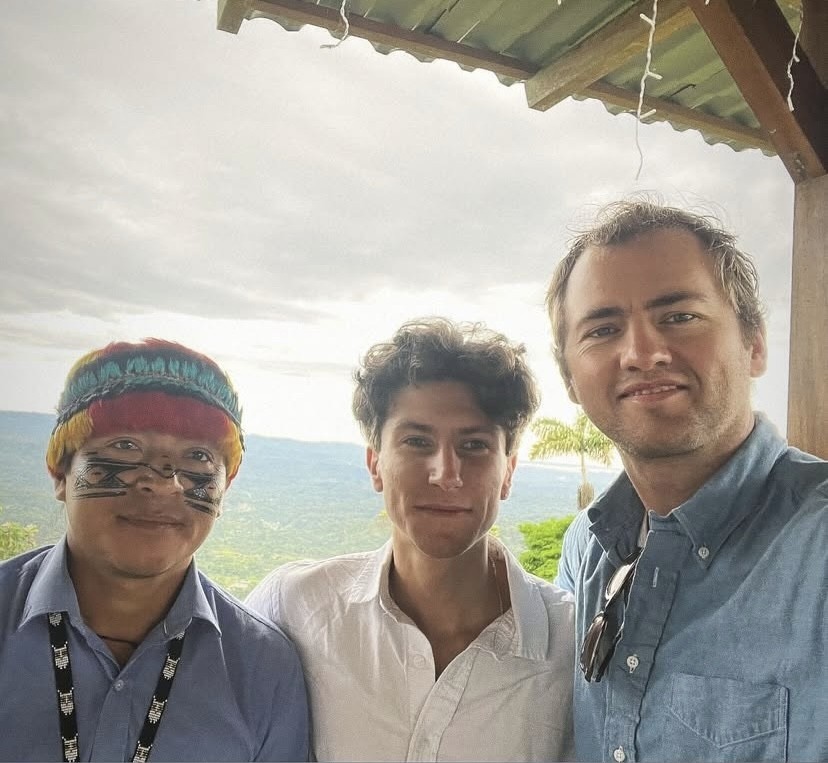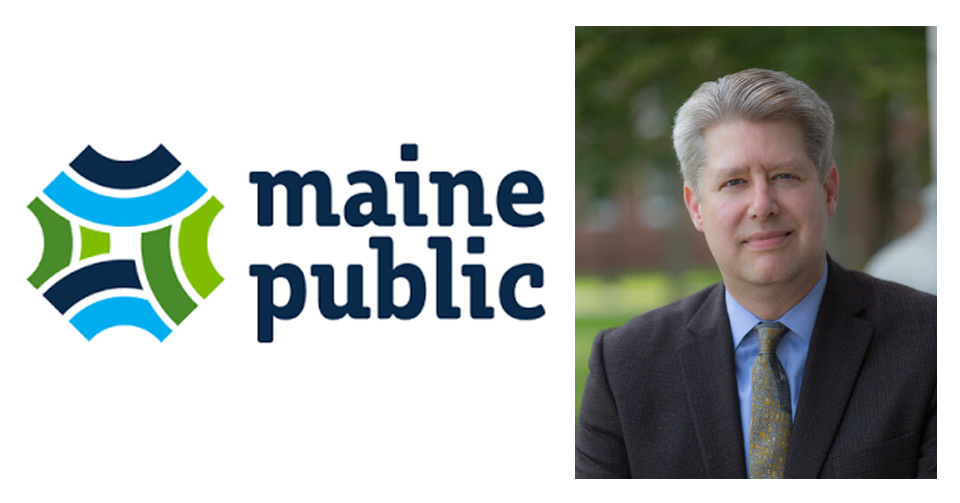Does the Trump Presidency Impact the Teaching of Politics and Economics?
By Tom Porter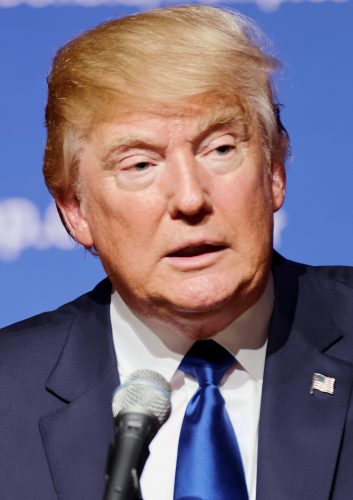
Whether you’re a Donald Trump supporter or not, most of us would probably agree these are momentous times, his presidency marking the beginning of a new era in US politics. Take for example President Trump’s decision, within a week of assuming office, to abandon the Trans Pacific Partnership trade deal, a key “signature” policy of the Obama administration. Consider also Trump’s communication style—particularly his fondness for Twitter as a medium for expressing his thoughts—and it becomes apparent that this is a new, unprecedented style of presidency.
So what does this mean for those whose job it is to teach contemporary American politics and economics? How might Trump’s policies and governing style impact the teaching of such topics, if at all? Some members of the government and economics faculties shared their thoughts with Bowdoin News.
Associate Professor Government Jeffrey Selinger
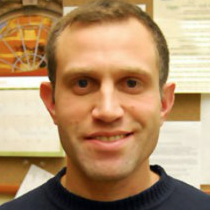
Our students are, of course, relatively new to politics and may not have a clear sense of the difference between what we’re witnessing on the national stage today, and conventional modes of politicking and institutional behavior practiced (and unquestioned) by leaders of both parties for quite some time. This is especially true for our first and second year students. As it happens, I’ll be teaching quite a few first and second year students this semester in my course, Introduction to American Government (GOV 1100). I think it’s incumbent upon educators to clearly mark the significant, and in some cases, radical departures that Donald Trump’s campaign, transition, and presidency has made from widely accepted historical norms. Students can, and should, be empowered to evaluate the potential merits and disadvantages of these departures. This kind of empowerment is possible, however, if, and only if, we call the differences between Trump’s practices and the status quo ante to their attention. This is what I hope to do.
Professor of Government Janet Martin

I am having to restructure my American Presidency course (GOV 2005) to accommodate a totally new and different kind of presidency. I first taught the course in 1981 (as a grad student!), and so have experienced all kinds of individuals in that office, but this is certainly going to be an unusual presidency. My students’ five minute documentary films that they make as part of the course will include the option of focusing on presidential humor: I am adding that section to the course given President Trumps’s request for “equal time” against Saturday Night Live!
Thomas Brackett Reed Professor of Government Andrew Rudalevige
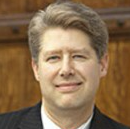
How will President Trump approach budgeting, rulemaking, the war powers, the federal workforce? How will the “rhetorical presidency” be affected by a tweeting president? How will the established political parties respond to the fact that neither seem to represent a majority of Americans? My classes deal with the person of the president, the institution of the presidency, the other branches with which those interact, and the policy that results. The new Trump administration is already offering reams of raw material for helping students understand all four of those areas and to evaluate how they have changed over time.
Gary M. Pendy Professor in Social Sciences Jean Yarbrough

I am making some changes to the syllabus in American Political Thought (GOV 2230). For starters, I am including William Graham Sumner’s essay on “The Forgotten Man,” a theme Trump popularized during his campaign. I always end with a consideration of contemporary liberalism/progressivism and conservatism. I am still looking for a thoughtful essay that will include populism. I will certainly want to explore the tensions between populism and constitutionalism. Stay tuned. The syllabus, like the incoming administration, is a work in progress.
William D. Shipman Professor of Economics John Fitzgerald

I teach courses in public sector economics and sometimes introductory macroeconomics that apply economic analysis to current and past policy, policy reforms, and proposed policies (ECON 2555, ECON 3511). President Trump’s proposals provide grist for the analytical mill. Evaluation becomes more salient to students when policies are discussed in the national news. So yes, it definitely affects (and has affected) the choice of topics, but the analysis and evaluation use a fairly standard set of tools. For example, although President Trump may argue that he has some new economics in mind that can repeal the Affordable Care Act, reduce health costs, maintain coverage, continue to require coverage for preexisting conditions, eliminate the insurance mandate, and rely on private health insurance, we can use basic economics tools to argue that this will be extremely difficult with insurance markets as we understand them.
Associate Professor of Economics Stephen Meardon
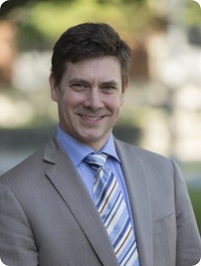
I spent the election season teaching a new group of students as Fulbright Chair of US Studies at the Universidad de las Americas, Puebla, Mexico. My courses on Trade Doctrines and Trade Deals (ECON 3526) and Political Economy of Pan-Americanism (ECON 2226 / LAS 2626), adapted for the new audience, turned out to be even more topical than before. Like most Mexicans, the students were extraordinarily interested in the outcome of the election and possible changes in US commercial policy. The ebb and flow of the campaign required continual improvisation in the classroom. When Donald Trump visited President Peña Nieto in Mexico City at the end of August and spoke of “keeping jobs here in this hemisphere,” we wondered about the implications. Did the invocation of “hemisphere” signal a qualification of his protectionist aims or an extension of them? International trade theory shows that it could go either way. So does history: US protectionists, most prominently Maine’s own James G. Blaine, had hemispheric trade-policy designs in the late nineteenth century, whereas the more recent and defunct initiative for a Free Trade Area of the Americas was conceived more as a way of creating trade than diverting it. The immediacy of the subject matter raised the stakes of each class session. It became a spontaneous forum for using economics and history to anticipate how politics could affect trade policy, and how policy could affect the livelihoods of ourselves and others.
